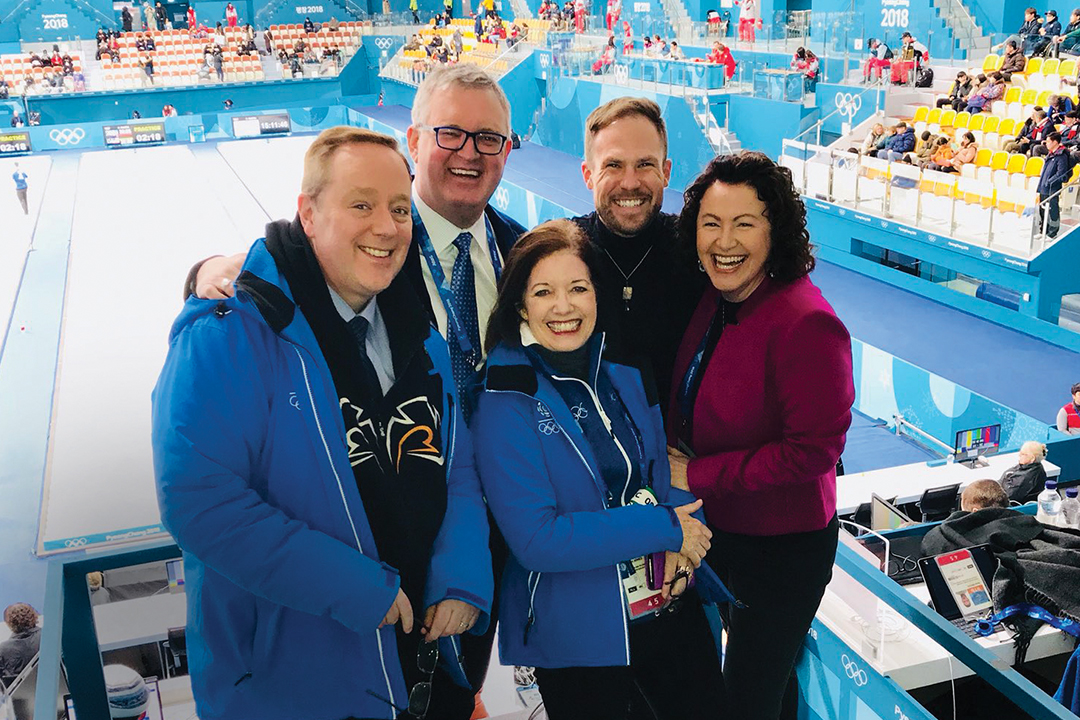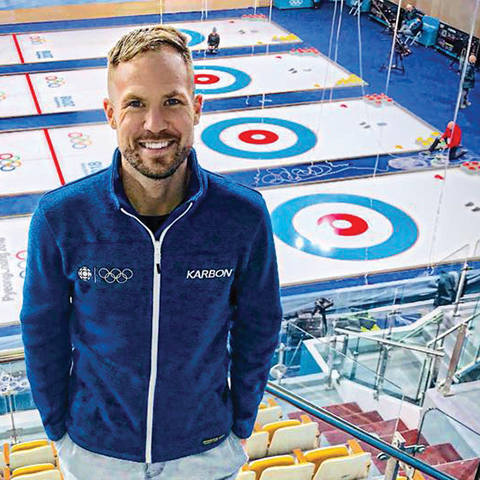
Olympic fever
Long days, long nights, deadlines, events, interviews. For some it sounds overwhelming, but for Devin Heroux (BA’09), he found the electricity at the 2018 Winter Olympics in South Korea exhilarating.
As a go-to reporter for CBC, Heroux spent his days running from venue to venue, bringing Canadians the stories of our Olympic victories and defeats.
Heroux was able to squeeze in a quick interview with the Green & White in-between covering the Olympics and the Paralympic games.

G&W: What did it mean to you to be able to cover the Olympic Games?
DH: Reporting at the Olympics has always been the goal and what an honour it has been to have covered these PyeongChang Games. To see the athletes realize their dreams in moments of athletic greatness is something I’ll never forget. I had watched these moments on TV over the years— there’s nothing quite like being there and talking to them moments after victory and defeat.
G&W: What was the atmosphere like in the Olympic village? In Canada House?
DH: In a lot of ways the atmosphere in the Olympic village was subdued and underwhelming. There was never really a palpable pride or buzz within the outdoor Olympic venues as I made my way from place to place. However, inside the venues there were magical moments. I’ll never forget being inside the big ice arena for short track speed skating. This is an event the Koreans excel in and the place was packed. On this night, a Korean won gold and set an Olympic record while doing it. The roar was deafening, the pride gushing from the crowd.
Inside Canada House, it was so quintessentially Canadian. Maple Leafs everywhere. Red and white everywhere. Poutine and beer at the ready, of course. More than anything though is that Canada House felt kind, welcoming and comfortable. It also served as Pride House—a place for LGBTQ athletes and fans to also feel welcomed. There was a back patio with reclined chairs, fire pits and blankets. For a moment, as I sat there one night, I felt as though I was sitting at my cabin in northern Saskatchewan with my family and friends. I guess that’s what Canada House is supposed to be about after all.
G&W: Live tweeting, Facebook posts, story updates—you did it all! How was it working on such tight timelines and with the time change?
DH: In a word, crazy. I’ve never worked harder in my life. I’ve never been more exhausted in my life. But I’ve never been so motivated and energized by the magic of it all. I’d wake up around 6 am every day to get a head start on coverage. Those first couple of hours were normally spent tweeting out information about what was to come in the day. So much of the Olympic experience is knowing where to be at those important moments—if you’re not on top of it, it can pass by you in a hurry. I had been preparing for this Olympic beat for a year which was hugely beneficial because the reality of the Olympics is that you only get a short time with the athletes after they compete. If you do pre-interviews though you already have the background knowledge to deliver compelling pieces. By the end of the day (which was usually anywhere from 11 pm to 1 am) people in Canada would start waking up and so it made it difficult to go to sleep with my phone getting notification after notification. Before I knew it, my alarm was sounding again and it was a new day of storytelling.
G&W: We have to ask—what was the favourite event you covered?
DH: There were so many great moments I was able to witness during the Olympics. Curling is my first love though and so what transpired in that curling rink is something I’ll never forget. The Korean women’s curling team became the face of the Olympics. The fans went crazy for them. The team placed first overall in the round robin and made it to the gold medal game. For a lot of the fans it was their first time watching curling—they really didn’t know what was going on but they cheered wildly. The best part is that at the finish of each end they really didn’t know if it was a good end or bad end until the score went up—if it went on Korea’s side they went even crazier.
The “Garlic Girls” as they became known as because of the region they grew up in, basked in it all. They had curling groupies making signs for them. They had groups of fans wanting autographs and selfies after each game. They won the country’s first medal in curling—a silver medal after losing in the gold medal game to Sweden. After that game their disappointment was so evident. They cried. But then in their moment of despair after the game, they stood together, lifted their heads and bowed to each section of the crowd. They smiled. It was a beautiful Olympic moment.
Heroux continued reporting for CBC in PyeongChang well into March for the Paralympics. By the end, he was in South Korea for over two months. Always an optimist, Heroux says he missed home and family, but it was the spirit of competition that kept him focused and able to continue telling stories.
DH: When the competition starts I’m reminded of how fortunate I am to be here telling these stories. And now the Paralympics, where courage, resilience and strength is abundantly evident at every turn. I’ve always felt incredibly blessed for this work because it provides me perspective I may not otherwise ever understand or experience.


